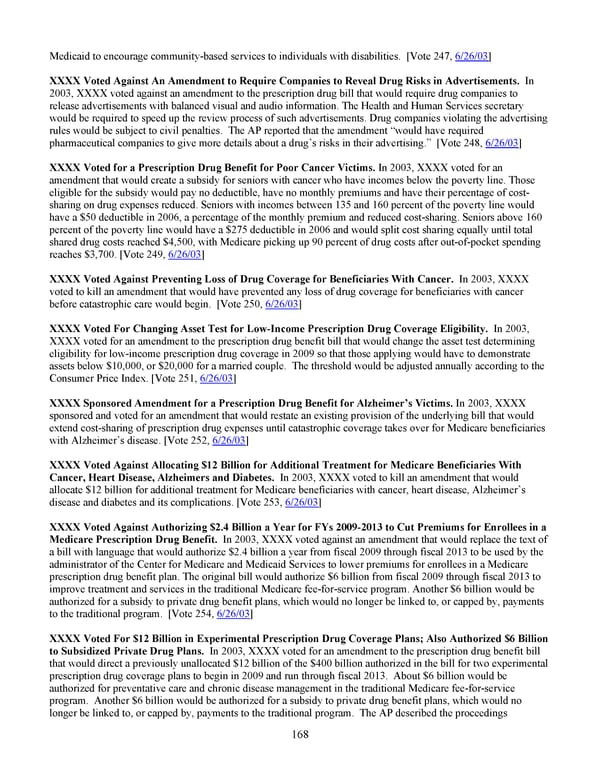Medicaid to encourage community-based services to individuals with disabilities. [Vote 247, 6/26/03] XXXX Voted Against An Amendment to Require Companies to Reveal Drug Risks in Advertisements. In 2003, XXXX voted against an amendment to the prescription drug bill that would require drug companies to release advertisements with balanced visual and audio information. The Health and Human Services secretary would be required to speed up the review process of such advertisements. Drug companies violating the advertising rules would be subject to civil penalties. The AP reported that the amendment “would have required pharmaceutical companies to give more details about a drug’s risks in their advertising.” [Vote 248, 6/26/03] XXXX Voted for a Prescription Drug Benefit for Poor Cancer Victims. In 2003, XXXX voted for an amendment that would create a subsidy for seniors with cancer who have incomes below the poverty line. Those eligible for the subsidy would pay no deductible, have no monthly premiums and have their percentage of cost- sharing on drug expenses reduced. Seniors with incomes between 135 and 160 percent of the poverty line would have a $50 deductible in 2006, a percentage of the monthly premium and reduced cost-sharing. Seniors above 160 percent of the poverty line would have a $275 deductible in 2006 and would split cost sharing equally until total shared drug costs reached $4,500, with Medicare picking up 90 percent of drug costs after out-of-pocket spending reaches $3,700. [Vote 249, 6/26/03] XXXX Voted Against Preventing Loss of Drug Coverage for Beneficiaries With Cancer. In 2003, XXXX voted to kill an amendment that would have prevented any loss of drug coverage for beneficiaries with cancer before catastrophic care would begin. [Vote 250, 6/26/03] XXXX Voted For Changing Asset Test for Low-Income Prescription Drug Coverage Eligibility. In 2003, XXXX voted for an amendment to the prescription drug benefit bill that would change the asset test determining eligibility for low-income prescription drug coverage in 2009 so that those applying would have to demonstrate assets below $10,000, or $20,000 for a married couple. The threshold would be adjusted annually according to the Consumer Price Index. [Vote 251, 6/26/03] XXXX Sponsored Amendment for a Prescription Drug Benefit for Alzheimer’s Victims. In 2003, XXXX sponsored and voted for an amendment that would restate an existing provision of the underlying bill that would extend cost-sharing of prescription drug expenses until catastrophic coverage takes over for Medicare beneficiaries with Alzheimer’s disease. [Vote 252, 6/26/03] XXXX Voted Against Allocating $12 Billion for Additional Treatment for Medicare Beneficiaries With Cancer, Heart Disease, Alzheimers and Diabetes. In 2003, XXXX voted to kill an amendment that would allocate $12 billion for additional treatment for Medicare beneficiaries with cancer, heart disease, Alzheimer’s disease and diabetes and its complications. [Vote 253, 6/26/03] XXXX Voted Against Authorizing $2.4 Billion a Year for FYs 2009-2013 to Cut Premiums for Enrollees in a Medicare Prescription Drug Benefit. In 2003, XXXX voted against an amendment that would replace the text of a bill with language that would authorize $2.4 billion a year from fiscal 2009 through fiscal 2013 to be used by the administrator of the Center for Medicare and Medicaid Services to lower premiums for enrollees in a Medicare prescription drug benefit plan. The original bill would authorize $6 billion from fiscal 2009 through fiscal 2013 to improve treatment and services in the traditional Medicare fee-for-service program. Another $6 billion would be authorized for a subsidy to private drug benefit plans, which would no longer be linked to, or capped by, payments to the traditional program. [Vote 254, 6/26/03] XXXX Voted For $12 Billion in Experimental Prescription Drug Coverage Plans; Also Authorized $6 Billion to Subsidized Private Drug Plans. In 2003, XXXX voted for an amendment to the prescription drug benefit bill that would direct a previously unallocated $12 billion of the $400 billion authorized in the bill for two experimental prescription drug coverage plans to begin in 2009 and run through fiscal 2013. About $6 billion would be authorized for preventative care and chronic disease management in the traditional Medicare fee-for-service program. Another $6 billion would be authorized for a subsidy to private drug benefit plans, which would no longer be linked to, or capped by, payments to the traditional program. The AP described the proceedings 168
 HRC vote skeleton Page 181 Page 183
HRC vote skeleton Page 181 Page 183